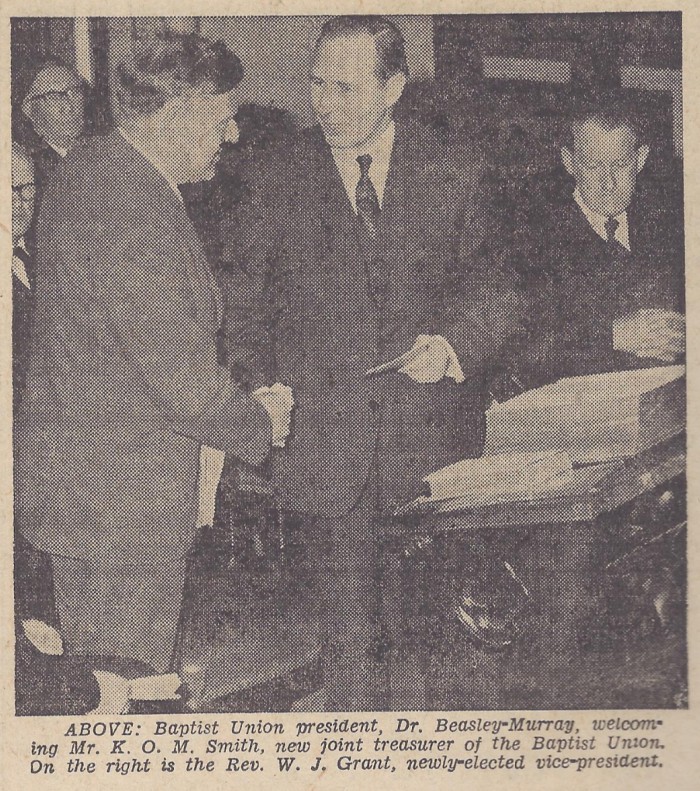Renewed for Mission
It's 50 years since George Beasley-Murray became President of the Baptist Union of Great Britain.
Andy Goodliff revisits George's Presidential address for this latest article from the Baptist Historical Society
It is nearly 18 years since George Beasley-Murray died. He played a huge role in the life of the Union, especially through the 1960s and 70s. He was one of our outstanding scholars as Baptists and among his many books Baptism in the New Testament and his commentary on the gospel of John continue to be widely read. When he died, one tribute said about him: ‘the mind of a scholar, the heart of an evangelist.’
Fifty years ago this month (29 April) Beasley-Murray was appointed President of the Baptist Union for 1968-69, and his address to the Assembly was entitled Renewed For Mission. The title was borrowed from the famous 1964 ecumenical conference in Nottingham, which had been called One Church Renewed for Mission. This conference famously set the ambitious target of church unity amongst the British churches by Easter 1980.
Beasley-Murray was responsible for the report Baptists and Unity which was the Union’s response to the Nottingham conference. He was committed to both ecumenism and mission.

A scan of George Beasley Murray, taken from The Baptist Times, 2 May, 1968, alongside an article entitled ‘Let’s stop apologising for the church-says the President, who also declares: Talking and doing must go hand in hand’.
In Renewed for Mission he begins by stating that the mission is God’s and that alongside the word is the importance of action. Beasley-Murray sees service in action as ‘expressive’ of proclamation and in that way evangelism takes priority: ‘to continue this proclamation, and action commensurate with it, is the essence of Christian mission.’
He goes on to challenge those in some ecumenical circles at that time who were arguing that mission was wherever people engaged with social action. He says, ‘Contrary to the strange contemporary fashion of Churchmen belittling the Church, we affirm that our task is to plant and build the Church through the Gospel, that in turn it may become a mighty force in the hand of the Lord for the accomplishment of his mission in the world.’
Beasley-Murray does agree with voices that were arguing that the church needed to change. He mentions Lesslie Newbigin’s argument that the structures of the church emerged when it was contracting rather than expanding, and agrees the church needs to establish a ‘go-church’ structure rather than a ‘come-church’ one. He suggests that what is required is for the Church to understand itself not ‘simply [as] a gathered congregation, but a gathered ministry.’
He moves this image to a military one, ‘the Church in our land needs to be on a war footing’ in which everyone is ‘enrolled in Christ’s Army.’ This Church renewed for mission needs ‘dedication’ and the ‘blessing of the Holy Spirit.’
He concludes that ‘to commitment of this order, in Christ’s name I call you, as I call myself; I call your church, as I call my church; I call our whole denomination. By the grace of God in the fellowship of the Risen Lord, and by the aid of the Holy Spirit, we shall surely then fulfil our mission to God’s glory and the eternal blessing of men [sic].’
Revisiting George Beasley-Murray’s presidential address after 50 years reminds us perhaps that we continue to need to be renewed for mission, and in ways that go beyond much of the faddism that has characterised much of what is termed mission and evangelism in the last 30 years. As Beasley-Murray recognised, renewal for mission goes part and parcel with renewal of the congregation and its worship.
For more about the life and ministry of George Beasley-Murray see Fearless for the Truth, a biography written by his son Paul Beasley-Murray. See also a special supplement of the Baptist Quarterly from 1991 of essays in honour of George’s 50th anniversary of his ordination.
This article is the fourth in a continuing series from Baptist Historical Society highlighting stories and moments from our past, early articles have looked at Anne Steele, W. T. Whitley, and Edith Gates.
To join the Society or learn more about our Baptist history, visit https://baptisthistory.org.uk
Baptist Times, 25/04/2018